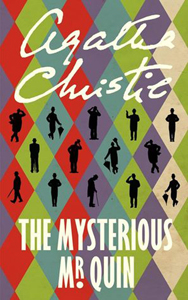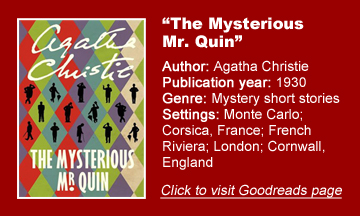Without peeking ahead at the reviews, I’m guessing “The Mysterious Mr. Quin” (1930) inspires a wide range of opinions among Agatha Christie fans. It’s certainly a different book. It’s a collection of 12 short stories, but it also needs to be read front-to-back like a novel (“The Tuesday Club Murders” shares this trait). It’s like one of those modern TV shows that has both standalone episodes and a running through-line.
Relationships on her mind
The mysteries are simpler than usual in construct but heavier on emotion; it could be that Christie was thinking about branching into her Mary Westmacott novels at this time (the first of those also came out in 1930).
I wasn’t surprised to learn that the author got divorced in 1928 and remarried in 1930, especially when reading the final story “Harlequin’s Lane.” She aims for a poetic, bittersweet portrayal of lost love and found love, making sure to give both members of the broken marriage a new love interest.
Despite the title, the main character is Mr. Satterthwaite, a wealthy 69-year-old patron of the arts. Christie was 39 at the time, but she was in a reflective mood, as she uses Satterthwaite to think about life decisions. He might stand for an alternate life path that the author rejected, as Satterthwaite is single and without children.
I covered theater, performing arts and visual arts back when newspapers covered those things, and Satterthwaite reminds me of one of those people who are part of the scene but are not himself or herself an artist.
Without distractions of a family life, Satterthwaite (who will reappear as the friend of actor Sir Charles in “Murder in Three Acts”) has developed a knack for observing others. But he’s also naturally modest. The mysterious (not mighty, not fantabulous) Mr. Harley Quin appears as a guide, popping up in each story to nudge Satterthwaite’s thinking processes.
Christie’s harlequin
“Mr. Quin’s” macro mystery is the identity of the title character. Having been assured by her catalog so far that the supernatural does not exist in the world of her novels (for example, “Murder at Hazelmoor” uses the supernatural as a red herring before settling on the real-world answer), I was curious about Mr. Quin’s true identity.
I peeked at the definition of “harlequin” around mid-book – it’s a mute, comic side character in dramas. Mr. Quin isn’t mute, but he is understated; he’s not funny, but his quick appearances and disappearances are inexplicable. Harlequins are also associated with lovers, and many of these stories involve relationship problems.
The most famous modern take on the harlequin is Margot Robbie’s talkative and mentally unhinged Harley Quinn in the DC Extended Universe; it’s apparently a flexible archetype.
But rather than getting closer to the answer as the book nears its end, Christie doubles down on Quin’s magical nature. In the end, we’re forced to conclude that he truly is a supernatural being. Since Satterthwaite also appears in the Poirot novel “Murder in Three Acts,” that means the supernatural exists in Poirot’s world. Strictly speaking, I’m not thrilled with that, but I don’t think we’re intended to dwell on it too much.

Character studies
The mysteries in “Mr. Quin” are, as you’d expect from short stories, not robust. I even landed on the solution to one of them, “The Face of Helen,” as I immediately recognized a pair of gifts as being the murder weapons. I almost never guess the solutions, because my brain doesn’t go down that path, partly because I enjoy the journey.
But these stories are excellent character studies. Friends, acquaintances and even strangers open up to Satterthwaite, who is then an excellent armchair advice-giver.
Someone who is solely interested in the procedural aspect of mysteries will find “The Mysterious Mr. Quin” to be frustratingly thin. But I found it to be an engaging peek into the workings of relationships and a fascinating snapshot of where Christie was at in her personal life and writing career.
Every week, Sleuthing Sunday reviews an Agatha Christie book or adaptation. Click here to visit our Agatha Christie Zone.


